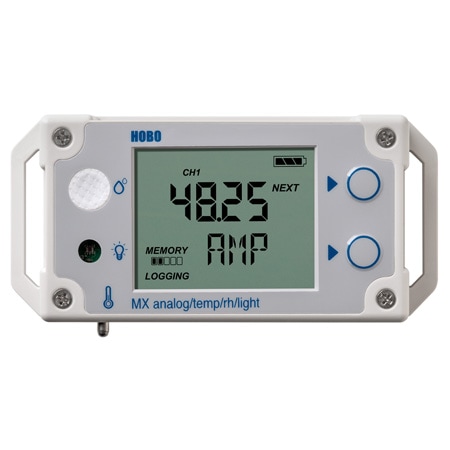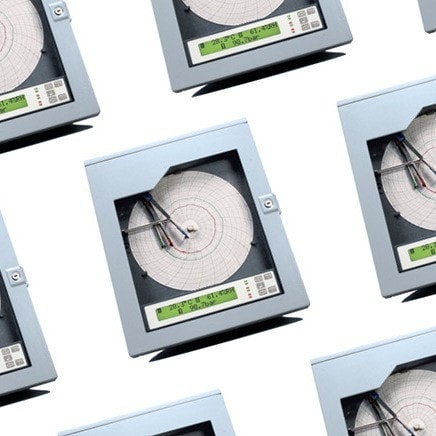In industrial environments, accurate measurement and documentation of process conditions are essential for ensuring quality, safety, efficiency, and regulatory compliance.
One of the most effective tools for this task are data loggers — electronic devices designed to automatically record measurements over time. These devices capture key process variables — such as temperature, pressure, humidity, voltage, or flow rate — and store the information for later analysis. Many modern data loggers also support real-time monitoring, remote access, and integration with supervisory control systems, making them a flexible solution for a variety of industrial applications.
Types of Data Loggers
Data loggers come in several specialized types, each designed to monitor and record different process variables under varying operational conditions. Understanding these categories is critical for selecting the appropriate logger to match your system requirements, compliance obligations, and data management strategy.
Temperature & Humidity Data Loggers
Temperature and humidity data loggers are engineered to capture and record thermal conditions over time, using internal sensors, external probes, or thermocouple inputs.
Advanced models may offer multi-point temperature profiling, programmable sampling intervals, alarm notifications, and NIST-traceable calibration to support regulatory compliance (e.g., FDA or HACCP standards).
-
Common Features:
-
✔ Internal or external sensor options
✔ Wide temperature ranges (-80 °C to 300 °C)
✔ Battery-powered for portability
✔ Data integrity protection during power loss
Pressure Data Loggers
Pressure data loggers measure and document variations in gas or liquid pressure, often crucial for maintaining safe and efficient operations in systems like HVAC networks, industrial gas supply lines, compressed air systems, and process piping.
Data logger selection may depend on required pressure ranges (e.g. inches of water column for HVAC vs. thousands of psi for industrial hyraulics).
-
Common Features:
-
✔ Compatibility with piezoresistive or strain-gauge sensors
✔ Sampling rates appropriate for detecting rapid pressure fluctuations
✔ Options for submersible or harsh-environment deployment
Voltage & Current Data Loggers
his type of data logger is especially useful in predictive maintenance programs, where identifying irregular electrical behavior can prevent unplanned downtime.
-
Common Features:
-
✔ AC and DC voltage monitoring capabilities
✔ Current monitoring using direct input or external current clamps
✔ Synchronized multi-channel recording
✔ High-speed sampling for capturing transient events
Multi-Channel or Universal Input Data Loggers
Multi-channel or universal input data loggers offer maximum flexibility by accommodating multiple sensor types simultaneously (e.g., temperature, pressure, voltage, flow).
They are ideally suited for complex systems requiring holistic monitoring, such as manufacturing lines, research facilities, or pilot plants.
Inputs may include thermocouples, RTDs, 4–20 mA transmitters, voltage sources, or digital state signals.
-
Common Features:
-
✔ Independently configurable input channels
✔ Data synchronization across all inputs
✔ Expandable memory for high-density recording
✔ Communication protocols such as Modbus RTU, Modbus TCP/IP, or OPC UA for integration with SCADA systems
Common Industrial Applications for Data Loggers
Data loggers are used across a wide range of industries to continuously monitor and record key process parameters, providing reliable data for performance validation, quality control, and system diagnostics.
| Application | Parameter Monitored | Example Use Case | Recommended Data Logger Type |
|---|---|---|---|
| Industrial Welding Gas Systems | Pressure | Verify stable delivery of shielding and fuel gases to maintain weld quality | Pressure Data Logger |
| Cleanroom Environmental Control | Temperature, Humidity | Monitor air quality and climate conditions to ensure process integrity | Multi-Channel Environmental Logger |
| HVAC System Performance | Temperature, Pressure | Evaluate system efficiency and validate operational safety | Compact USB or Wireless Logger |
| Refrigeration and Cold Chain Monitoring | Temperature | Maintain proper storage conditions for temperature-sensitive materials | Temperature Logger with Alarm Functionality |
| Wastewater Treatment Processes | Pressure | Track pump performance and prevent overflow conditions | Pressure Data Logger |
Why Use Data Loggers in Industrial Applications?
Industrial Data Loggers
Connectivity & Integration Options
- ✔ Analog inputs
- ✔ Digital I/O
- ✔ Modbus RTU/TCP
- ✔ Cloud access
- ✔ Wireless
Manual data collection is not only time-consuming but also prone to human error. In contrast, automated data logging provides:
-
Consistent, high-accuracy readings across extended time periods.
Reliable process documentation for audits, reporting, and compliance.
Early detection of anomalies that could indicate equipment failure or unsafe conditions.
Support for predictive maintenance strategies, reducing downtime and repair costs,
Improved process validation and optimization through trend analysis.
By automating these critical tasks, data loggers free up personnel to focus on higher-level system monitoring and problem-solving.
Contact a DwyerOmega Expert Today!





